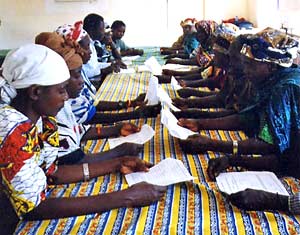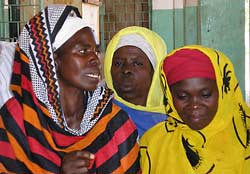UC Berkeley Press Release
Old drug's new use will save Nigerian women's lives
| What looks like a wetsuit and saves lives? This odd garment may increase survival chances for women with obstetrical hemorrhage, says a study from Berkeley's School of Public Health. More > |
Backed by technical assistance from a team of researchers at University of California, Berkeley's School of Public Health, a group of Nigerian health professionals won approval for the drug at a January meeting of the Nigerian National Agency for Food and Drug Administration and Control. Now, the first load of the drug is on its way to Nigeria from the Chinese factory where it was manufactured.
 These traditional midwives are being trained by UC Berkeley's Ndola Prata for a study in the use of misoprostol in Tanzania. The drug has been found to be safe and effective in treating post-partum hemorrhage, the life-threatening bleeding that can occur immediately after childbirth. (Bixby Program photos) |
"It's our hope to decrease maternal mortality in Africa in places where there are few resources and few facilities," said Ndola Prata, a physician from Angola who is a lecturer in the UC Berkeley School of Public Health and heads the scientific research in the school's Bixby Program in Population, Family Planning and Maternal Health. "Of each 100 women who go into labor in Nigeria, between 15 and 20 will develop post-partum hemorrhage. Although the majority will survive, most of those who do will suffer from severe anemia-related health problems for weeks or months after delivery. This drug will have a huge impact both in decreasing those problems and in preventing maternal deaths."
Misoprostol has been marketed since 1987 for treatment of gastric ulcers. Although its value for post-partum hemorrhage, or PPH, has been recognized since the early 1990s, the drug has not been distributed in most of the developing countries where maternal mortality rates are highest.
After its patent expired in 2000, interest in misoprostol as a PPH medication surged. Encouraged by initial studies indicating potential benefits in poor countries, a group of leading African obstetricians seeking to bring the drug into their own countries asked for help from obstetrician Malcolm Potts, Bixby Professor in the School of Public Health and founder of its Bixby Program, and Martha Campbell, a lecturer at the school and founder of Venture Strategies for Health and Development, a non-profit organization.
 These three traditional midwives in Tanzania are participating in a study of the drug misoprostol, which is considered ideal for use in developing countries. Not only is it inexpensive, but it's effective, safe and easy to use, and it stores well for many months at room temperature in the tropics. |
Since then, the group at Bixby has swung into action on the project: Prata has worked with doctors in Tanzania, Nigeria, Uganda, Egypt and Bangladesh providing technical assistance for trials and other studies; the group is helping to establish plans for the use and distribution of misoprostol in various countries; and several team members are developing educational materials for training traditional midwives in the use of the drug. In addition, Prata and Melodie Holden, an economist and engineer who holds a faculty position in the School of Public Health and is director of operations for Venture Strategies, constructed the technical regulatory application for misoprostol's approval in Nigeria.
Venture Strategies is also playing a central role in these efforts.
"Some of our work is best conducted through a private organization," Campbell said. "I founded Venture Strategies in 2000 to draw on the expertise of the School of Public Health to help low-income people in developing countries." With the scientific base of the technical team at the school, Venture Strategies has supported policy meetings in three African countries and is organizing arrangements with drug manufacturers and distributors to make misoprostol available.
Misoprostol is a hormone-like drug that rapidly stimulates powerful uterine contractions. In a normal labor, contractions after birth deliver the placenta in a timely fashion and start the process of reducing the uterus back to its normal size. If this process is delayed or fails, the bleeding that accompanies childbirth becomes excessive. By stimulating contractions, misoprostol can both prevent the bleeding before it starts, or stop it after it has started.
Although two drugs, oxytocin and ergometrine, are already licensed for PPH, neither can be used outside of a clinic or hospital setting, as they require cold storage and administration intravenously or by injection by a medically-trained person. In developing countries - where most births take place at home and are unsupervised or attended either by family members or a traditional midwife, who may be illiterate - these drugs are simply unavailable.
Misoprostol, on the other hand, is stable enough to sit on a shelf in a house in the tropics for months. It can be safely administered as a rectal suppository by a midwife, or the patient can swallow it as a pill. It's inexpensive: The wholesale price of the Chinese shipment headed toward Nigeria is just 15 cents per 200 microgram tablet, which works out to 45 cents for a three-tablet preventive dose, or 75 cents per five-tablet treatment dose. And none of its few side effects - shivering, nausea, elevated body temperature - are life-threatening.
Worldwide, one maternal death - defined as death caused by pregnancy or childbirth - occurs every minute: Ninety-nine percent of all these deaths happen in developing countries. Of the many causes of maternal death, PPH holds the top spot, accounting for one in four. Risk factors for PPH include malnourishment, anemia, poor health and giving birth to many children. In Nigeria, where most of these factors are widespread, PPH is the cause each year of almost 15,000 of the 55,000 maternal deaths.
For now, the Nigerian health agency has approved misoprostol for use in hospitals or clinics only. Within a year, the agency will review this policy. Prata expects that restrictions will be lifted then and the drug will be made available for use by traditional midwives throughout the country. "The ultimate goal is to bring the drug to the place where women deliver," Prata said. "Our hope is that this drug will become so widely available that all women will routinely receive it, even when they deliver at home."
Two other members of the School of Public Health faculty who are among the leaders in the Bixby Program's misoprostol work are Anke Hemmerling, a gynecologist from Germany; and Farnaz Vahidnia, a doctor from Iran. With its many international members, the Bixby group can conduct its work in 14 languages.

